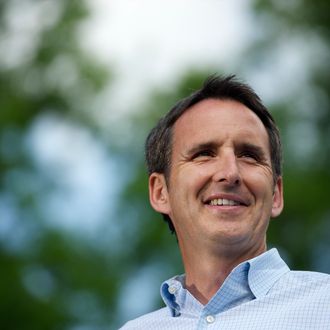
In a new Bloomberg Businessweek story, former GOP hopeful Tim Pawlenty doesn’t even try to defend his decision to became CEO of the Financial Services Roundtable, the big-bank lobbying organization, a year after telling Wall Street bankers to “get [their] snout out of the trough” during his failed presidential run.
He doesn’t have to; the reason Pawlenty left the public sector is plain as day:
Pawlenty might have had a shot at a second-tier Cabinet post in a Romney administration, or he could have gone home to run for the U.S. Senate. He decided instead to sample the private sector. His most recent salary as governor was $121,000. He and his wife, Mary, have a daughter in college, another in high school, and no family fortune. The Roundtable won’t reveal his starting pay, but there’s no reason to think it’s less than the nearly $2 million Bartlett collected.
Sort of makes sense, no? You, too, might take a 1553 percent raise, if all you had to do was use your national political brand to parrot financial-industry talking points for a few years.
What’s surprising is that Pawlenty isn’t even very good at feigning interest in what the Financial Services Roundtable does. Here is his argument in favor of the FSR’s primary legislative goal: repealing Dodd-Frank, or substantially watering it down to make it more bank-friendly.
He argues that Dodd-Frank, as passed, did enough to address the too-big-to-fail problem. The law required large banks to draft “living wills,” or contingency plans anticipating how they would be liquidated in a crisis. And it created a financial stability council charged with monitoring excessive risk-taking. Wall Street, according to Pawlenty, has been sufficiently weaned from the bailout trough. We’ll only ever know whether the Dodd-Frank provisions will work for an orderly breakup of some future Lehman if another institution that large and that interconnected to the rest of the financial system threatens to go over the cliff.
Pawlenty’s dismissal of Dodd-Frank isn’t particularly sensible. (For one, saying that “living wills” will prevent another Lehman is like saying that giving emergency evacuation instructions on airlines reduces the likelihood of plane crashes.) But moreover, it’s not particularly novel. You could get the same explanation from any junior lobbyist on Capitol Hill, or any middle-manager on Wall Street.
Lobbying groups aren’t dumb — they know that brand-name politicians can bring some of their credibility (and their political connections) to help push their agendas. But they also hire for personality and energy, and Pawlenty is showing as much verve attacking Dodd-Frank as he did attacking Newt Gingrich on the stump. Which is to say, very little.
Granted, he hasn’t had much time to study. (Pawlenty’s condition for doing the Businessweek interview was that they couldn’t ask him “detailed policy questions.”) Still, for $2 million a year or thereabouts, he might at least try to perk up.





























